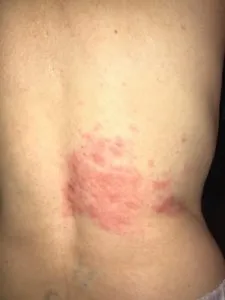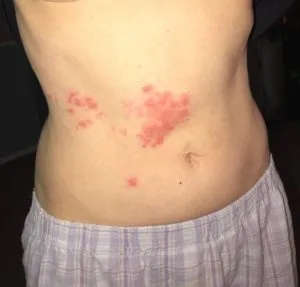What can stress do to our skin and hair?
Stress and Your Skin
Part 1
We all know that stressis responsible for many things including changes in appetite, sleep, and mood. But did you know that stress can have many effects on the skin and hair as well?
One of the most common triggers for a skin condition called Herpes Zoster is stress!
What is Herpes Zoster?
Herpes zoster, more commonly known as “shingles,” is a localized, blistering and painful rash caused by reactivation of varicella-zoster virus (VZV), the same virus that causes chickenpox.
Who gets it and what causes it?
Anyone that has previously had chickenpox may subsequently develop shingles. Shingles can occur in childhood but is much more common in adults, especially older people and those under increased amounts of stress. After primary infection—varicella—VZV remains dormant in dorsal root ganglia nerve cells in the spine for years before it is reactivated and migrates down sensory nerves to the skin to cause shingles. It is not clear why shingles affects a particular nerve fiber.

How do I know if I have it?
The first sign of shingles is usually pain, which may be severe. The pain is often described as a needle stabbing, a deep ache, or similar to how a pulled muscle can feel. The pain may be just in one spot, or it may spread out. It can make you feel unwell, with symptoms such as fever and headache. Within 1-3 days of the onset of pain, a blistering rash appears in the painful area of skin. It starts as a crop of red papules. New lesions continue to erupt for several days within the distribution of the affected nerve, each blistering or becoming pustular then crusting over.
How is shingles treated?
Early treatment is key! Antiviral treatment can reduce pain and the duration of symptoms if started within 1-3 days after the onset of shingles. Some examples of antivirals include valacyclovir, acyclovir, and famciclovir. Management of acute shingles may include: (1) rest and pain relief (2) protective ointment applied to therash (petroleum jelly) (3) oral antibiotics for secondary infection (4) prednisone for severe cases.
If you are suffering from shingles, or have any other skin-related concerns, please reach out to your dermatology provider.
NW Dermatology Institute is now offering telemedicine appointments. If you are interested in speaking with a member of our staff, call 503–223–1933 or schedule an online appointment at https://pdxderm.com/book-appointment/.

